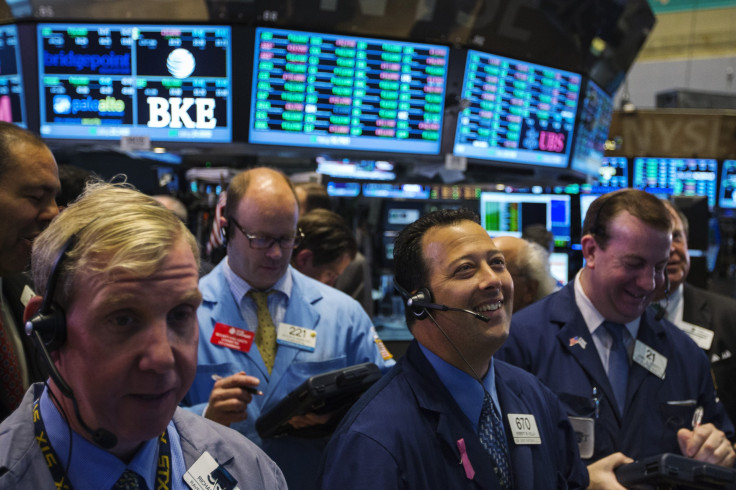U.S. Stocks Could Open Higher Despite A Global Selloff Over Syrian Crisis

U.S. stock index futures suggest a higher opening to markets on Wednesday, despite growing fear of a possible U.S.-led military strike in Syria, which rattled global markets and triggered panic sell-offs. U.S. investors are also awaiting the release of pending home sales data on Wednesday.
Futures on the Dow Jones Industrial Average were up 0.13 percent, while futures on the Standard & Poor's 500 Index were up 0.15 percent and those on the Nasdaq 100 Index were up 0.19 percent.
According to some analysts, the impact on emerging markets of a possible U.S.-led military intervention in Syria and concerns about the the U.S. Federal Reserve’s decision to change its easy monetary policy stance, could ultimately force the Fed to reconsider its tapering schedule and instead continue with its bond-buying policy in the near term.
“As the turmoil grows worse, it will stop global growth in its tracks. And the net result? The Fed will carry on printing money longer than it planned to. It won’t have any other choice,” Matthew Lynn, a columnist for MarketWatch, wrote on its website.
“The U.S. cannot simply shrug aside an emerging-market crisis or a conflict in the Middle East as a matter of little consequence... With no expansion in those markets, U.S. growth will evaporate, and with it the case for the taper,” he added.
The crisis in Syria escalated on Wednesday, as possible military intervention by the U.S. and its allies loomed large over the Middle East after media reports pointed to the emergence of more evidence on the use of chemical weapons by Bashar al-Assad’s regime.
According to reports, U.S. President Barack Obama and British Prime Minister David Cameron are convinced that the Syrian government used nerve gas against its own people.
“Both leaders agreed that all the information available confirmed a chemical weapons attack had taken place, noting that even the Iranian President and Syrian regime had conceded this,” a Downing Street spokesperson told Agence France-Presse, after the two leaders spoke on the phone Tuesday night.
"The PM confirmed that the government had not yet taken a decision on the specific nature of our response, but that it would be legal and specific to the chemical weapons attack," the spokesperson added.
U.S. Defense Secretary Chuck Hagel, who is in Brunei to participate in two-day talks with Asian defense leaders, also reportedly said that the U.S. military stands ready to strike against Syria if President Obama gives the order.
Meanwhile, the latest media reports said that a team of U.N. inspectors had left for the site of the alleged chemical weapons strike and U.N. chief Ban Ki-moon appealed for a diplomatic solution to the crisis.
Back in the U.S., the National Association of Realtors' pending home sales index for July will be released at 10 a.m. EDT. The index, which measures the change in the number of homes under contract to be sold but still awaiting the closing transaction, excluding new construction, is likely to decline 0.5 percent in July after declining 0.4 percent in the prior month.
In Europe, markets traded lower for the third consecutive session, on Wednesday, over rising tensions in Syria. The Stoxx Europe 600 index was trading down 0.54 percent, London’s FTSE 100 was down 0.5 percent, Germany's DAX-30 was down 0.83 percent and France's CAC-40 was trading down 0.13 percent.
Markets across Asia, fell steeply on Wednesday following concerns over a strike on Syria, but recovered some ground toward the end of their respective trading sessions.
The MSCI All Country Asia index, excluding Japan, fell 0.98 percent on Wednesday while the Philippine stock index, PSCi, plunged 3.02 percent. Indonesia’s JSX Composite fell 3.71 percent and Japan’s Nikkei lost 1.51percent after the yen rose 1.5 percent against the dollar overnight, while Australia’s S&P/ASX 200 dropped 1.05 percent.
In China, the Shanghai Composite index was trading down 0.11 percent while Hong Kong’s Hang Seng Index plunged 1.6 percent. South Korea’s KOSPI Composite index was down 0.07 percent.
India’s BSE Sensex was trading flat after falling 1.53 percent earlier on Wednesday after the rupee hit fresh record lows against the dollar. India's domestic currency opened, on Wednesday, at a new record low of 66.90, breaching the record of 66.30 set in the previous session, and fell another 4 percent to 68.75 in intraday trading. In late-afternoon trade, the rupee was trading at 67.84.
However, analysts described the current panic in global markets as irrational and said markets would soon stabilize.
“This selloff is a clear knee-jerk reaction by global market participants who are clearly reducing risk over fears the situation in Syria could deteriorate substantially. It’s just a typical case of irrational fear driving investors’ decision making,” Tim Radford, an analyst at Rivkin Securities, told MarketWatch.
© Copyright IBTimes 2024. All rights reserved.












